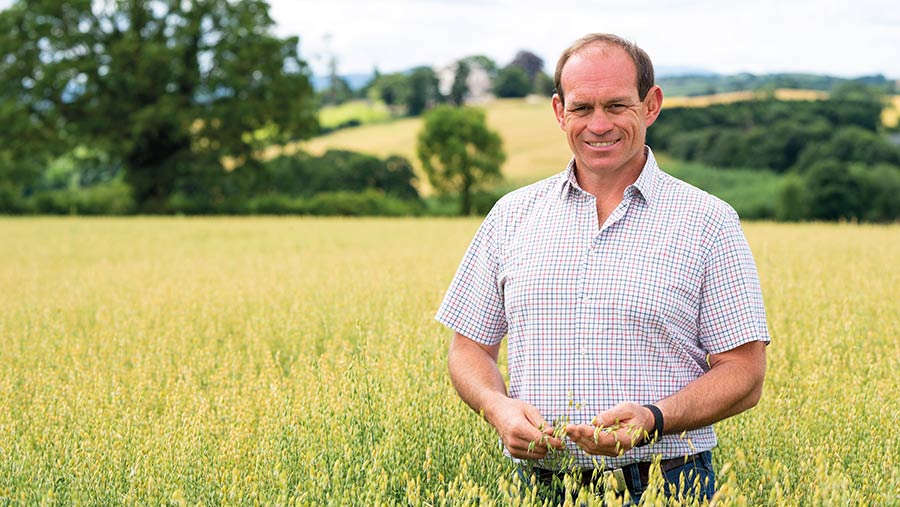Farmers Weekly Awards 2021: Arable Farmer of the Year
 Simon Best, Farmers Weekly 2021 Arable Farmer of the Year © Steffan Hill
Simon Best, Farmers Weekly 2021 Arable Farmer of the Year © Steffan Hill Simon Best, Acton House Farm, County Armagh
While County Armagh in Northern Ireland is known for its orchards and livestock grazing, it’s also home to an arable pioneer who has developed a sustainable cropping business supplying local markets.
Arable Farmer of the Year Simon Best’s love for the environment stems from when he started growing oats for a local miller, earning a premium for adopting wildlife-friendly measures.
He is also a Linking Environment and Farming (Leaf) farmer, a member of the Nature Friendly Farming Network, and has gone about improving his soil and slashing fertilizer inputs with a “less-is-more” mindset.
Farm facts
- 465ha arable cropping
- Cropping consists of feed wheat, winter and spring milling oats, oilseed rape and beans
- Establishment based on plow and Horsch Express KR power harrow and drill combination
- Crops following oilseed rape and beans cultivated with Sumo or Joker disc cultivator
- Soils range from sandy loam to clay
The challenge
Having retired from being an Ulster and Ireland rugby player, Simon went back to the family farm, which was already undergoing a transformation from a mixed beef, sheep and cereals farm to a predominantly arable-focused business.
However, the climate (with annual rainfall of 900-1,000mm), land type and hilly, small fields are limiting factors to out-and-out yields, so he has had to focus on margins instead.
Another challenge was the lack of markets in Northern Ireland for break crops such as beans.
Simon also wanted an environmentally sustainable system, because he believes in leaving the land for the next generation in as good condition as he inherited it.
The journey
Simon has expanded the farmed area from 145ha to 465ha, making his farm one of the largest arable enterprises in Northern Ireland.
This expansion happened at the same time as the family diversified into a green waste recycling business, taking material from local councils to produce compost. This delivered a valuable new revenue stream.
The compost has been used to improve soil health. He is also minimising soil erosion by using RTK guidance to enable drilling across slopes while running spray tramlines at an angle.
Being unable to go for out-and-out yield, he has developed strong links with local markets, keeping supply chains as short as possible.
Most feed wheat and barley goes to a pig producer three miles away. Simon also supplies a local pigeon feed producer, and rapeseed is supplied to the local broiler industry.
Milling oats are contracted to Whites Oats, five miles away, to supply Jordans, and earn a premium. Straw is also a key crop, with strong demand from the surrounding livestock farms.
Simon has adopted the latest technology to better target nitrogen fertilizer use, with regular in-season sap and tissue testing carried out to enable applications according to crop needs.
Achievements
Simon has shown how a large arable enterprise can be run in a predominantly livestock area without compromising the environment.
The strong focus on soils has seen him build organic matter through the use of compost from the green recycling business, with soil organic matter now standing at 7.5-11%.
His use of plant testing technology has seen bagged nitrogen use fall by up to 30%, and all potash and phosphate needs are fully met through compost.
Insecticides haven’t been used for five years and he is reducing cultivations, using a disc cultivator instead of the plow when following oilseed rape and beans.
One key achievement is the development of a bean market, adding another break crop to the rotation.
In conclusion, Simon has shown that arable farming can thrive in a livestock-dominated Northern Ireland, producing high-quality food to high environmental standards.
Winning ways
- Northern Ireland pioneer creating an environmentally-sustainable arable business
- All crops grown for a specific local market
- Excellent integration of compost and arable businesses
- Works with college and government to develop new Northern Ireland crop markets
- Really good awareness of carbon
- Strong part of the local community
A word from our independent judge
“Simon has developed a successful and progressive farming business on a scale that would be impressive anywhere, but unprecedented in Northern Ireland. He has created a sustainable operation that also benefits others in the region. ”
Damian McAuley, AICC agronomist
Our other finalists were:
- Andy Barr, East Lenham Farm, Kent
- Stephen Briggs, Whitehill Farm, Cambridgeshire
The Farmers Weekly 2021 Arable Farmer of the Year Award is sponsored by Fendt
![]() Farmers Weekly’s farming awards celebrates the very best of British agriculture by recognising hard-working and innovative farmers across the UK.
Farmers Weekly’s farming awards celebrates the very best of British agriculture by recognising hard-working and innovative farmers across the UK.
Find out more about the Awards, the categories and sponsorship opportunities on our Awards website.

